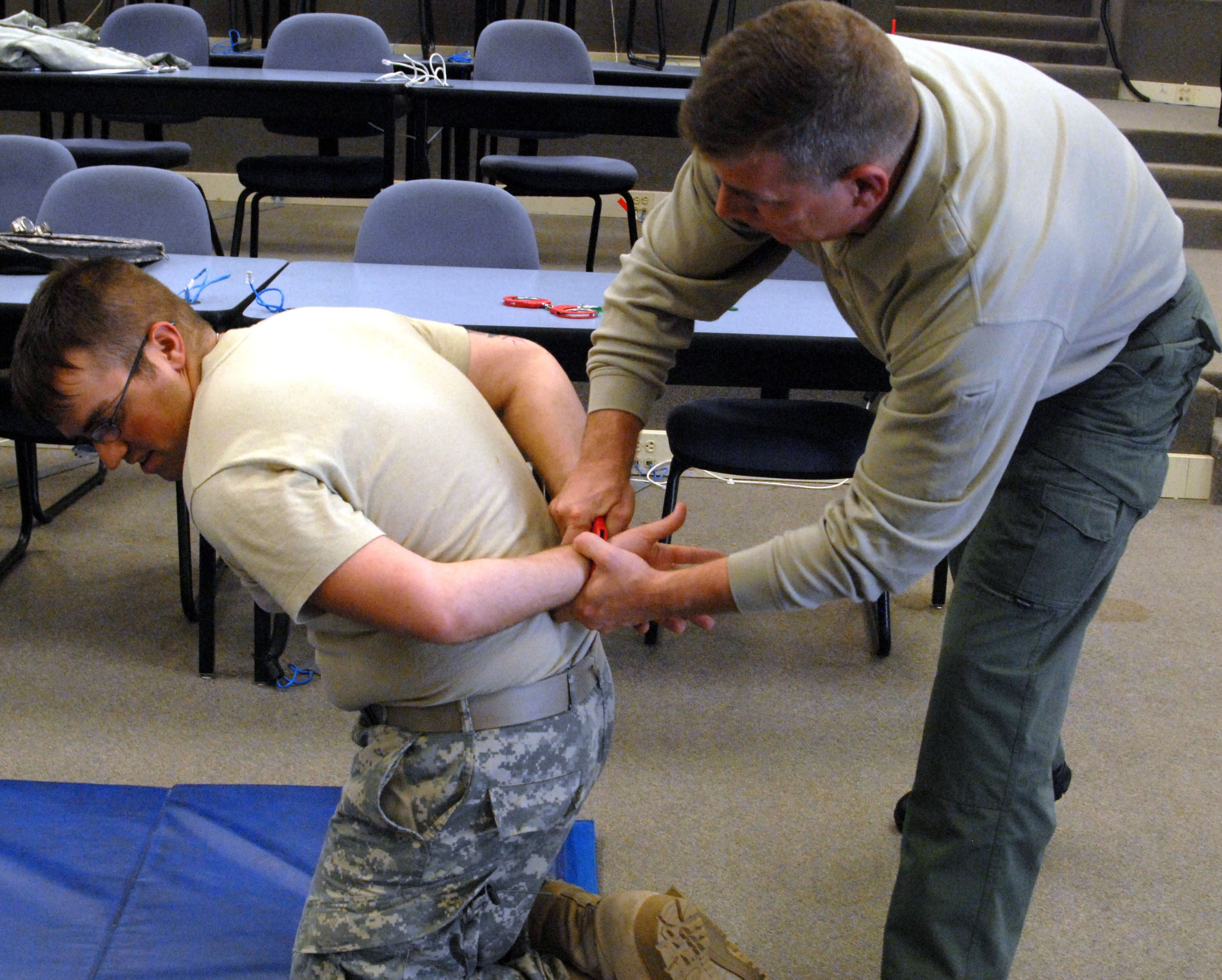Those who live and work on the installation will soon begin to see a decrease in the number of military police and an increase in Department of the Army civilian police.
That increase is attributed to the hiring of 31 civilian officers for the post.
Those hired must attend the Fort Knox three-week Law Enforcement Certification Course. The new hires are comprised of former and retired MPs and officers with the post's civilian police force.
Lt. Ronald Reyna, the Fort Knox training instructor, said the course isn't new to the installation. It's available to military police personnel in order to familiarize them with the garrison mission.
"The course has a two-fold mission," said Reyna. "It refreshes their skill level and brings them back to the roots of policing."
He pointed out that attending the Knox academy prepares his officers for the nine-week police academy course that is offered at White Sands, N.M., Fort Leonard Wood, Mo., and Aberdeen Proving Ground, Md.
By attending the Knox academy, Reyna said his officers receive eight certifications which include two hazardous materials courses, CPR, ASP expandable baton training, and training on the use of pepper spray.
The new officers also receive classes from Knox Army Community Service about child abuse, sex crimes, and domestic violence.
Reyna said the most difficult part of the training is learning the challenging Kentucky penal code.
"One word can make a difference in how you charge someone," he said. "You have to be able to read that manual and articulate proper charges. (An officer's) greatest weakness is the Kentucky laws. I instruct a lot on the Kentucky Revised Statute."
In addition, the officers are also required to learn the Uniform Code of Military Justice, along with federal, military, and civilian law.
Reyna added that participating in a mock trial allowed the officers to see how things are done in a courtroom.
Staff Sgt. Israel Barreto of the 34th MP Detachment said attending the course allowed him to learn different aspects of law enforcement.
Barreto is a 31E, an internment/resettlement specialist, who is currently waiting for approval of his packet to become a criminal investigator. His training and experience had been in corrections.
"There is a different mentality with prisoners than with the public," said Barreto. "There are different issues as a military police investigator. We are called in to (break up) fights and (search) for contraband."
Although most of the training was parallel to working in corrections, he noticed handcuffing techniques differed.
Instead of one-on-one interaction when handcuffing, where there is a chance for resistance, inmates slide their hands through a slot in the cell door.
Like most of the officers who attended the academy, Barreto said learning the KRS was challenging because inmates in the Regional Correctional Facility are subject to the Uniform Code of Military Justice.
Barreto also said learning about different issues that his civilian counterparts encounter is much different than working with inmates.
"When (the inmates) talk to you its parade rest and everything is dress-right-dress," he said. "The inmates have to shave, their haircuts have to be within the regulation, and they have to make their bunks."
Attending the academy allowed retired Staff Sgt. John Weatherington to learn new procedures and technology that has been implemented since his retirement in 2002.
Weatherington has worked as a federal air marshal and for the Kentucky Department of Juvenile Justice.
"I haven't worked law enforcement in a while and they have equipment I have never used," said Weatherington. "The technology is more advanced."
Unlike most of his peers, Weatherington said the KRS portion of the course wasn't difficult because of his work in the juvenile justice system. But he was quick to add that learning the statutes is important because many of the younger officers haven't taken any criminal justice courses.
"The KRS gives Soldiers some understanding of a Terry stop, (which prohibits unreasonable search and seizures)," explained Weatherington. "I haven't worked road duty since 1984, so it's good to have a class like this."
Although the academic portion of the training was sometimes challenging, Reyna said the officers enjoyed the hands-on practical exercises.
He pointed out that many of the officers said that after being peppered- sprayed they are more sensitive about its use, and in some cases would issue an extra verbal warning before using the spray.
Since graduating from the Knox Academy Wednesday, the officers will now attend the nine-week Law Enforcement Academy.
Reyna said that last week five officers from Fort Knox graduated from the academy in White Sands.
"They come back with a lot of pride, (because now) they can wear their badge," said Reyna.






Social Sharing